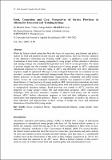| dc.contributor.author | Share, Michelle | |
| dc.contributor.author | Hennessy, Marita | |
| dc.date.accessioned | 2019-05-29T10:42:58Z | |
| dc.date.available | 2019-05-29T10:42:58Z | |
| dc.date.issued | 2019 | |
| dc.identifier.citation | Share, Michelle, & Hennessy, Marita. (2019). Food, connection and care: perspectives of service providers in alternative education and training settings. Irish Journal Of Applied Social Studies, 19(1), 33-50. | en_IE |
| dc.identifier.issn | 2009-8642 | |
| dc.identifier.uri | http://hdl.handle.net/10379/15200 | |
| dc.description.abstract | While the formal school system has been the focus for researchers, practitioners and policy-makers for food and nutrition-related research and interventions, there has been less attention to the Alternative Education and Training (AET) sector. A qualitative social ecological examination of food issues among marginalised young people in Irish alternative education and training settings was conducted through interviews with 15 service providers. We aimed to provide insight into the everyday food practices of young people in AETs, understand educational responses to food and eating in AETs, and determine how these educational responses might be optimised. Through a socio-ecological framework, we examined service providers accounts beyond individual (intrapersonal) factors that related to young people s dietary practices, to include interpersonal, organisational, community and policy-related factors. Across the socio-ecological framework analysis was organised in terms of four broad themes: (i) food practices of young people in AET; (ii) food and connection; (iii) food, place and community; (iv) teaching and learning about food and health to marginalised you in marginalised education settings. Food provision was central to AETs activities and impacted on young people s home life and employment prospects. AETs experienced challenges: food provision resources; expertise to address food issues; and the tension between AETs holistic educational response to food and their obligation to provide certification and employment pathways. There is an opportunity to harness the interest in food, education and empowerment in these settings to bridge the social and nutritional dimensions of food for/with young people. | en_IE |
| dc.description.sponsorship | This paper is based upon work funded by Safefood. We are grateful to the young people and
service providers who participated in this study and to the Study Advisory Group for their
interest and support during the course of the study. | en_IE |
| dc.language.iso | en | en_IE |
| dc.publisher | Social Care Ireland | en_IE |
| dc.relation.ispartof | Irish Journal Of Applied Social Studies | en |
| dc.rights | Attribution-NonCommercial-NoDerivs 3.0 Ireland | |
| dc.rights.uri | https://creativecommons.org/licenses/by-nc-nd/3.0/ie/ | |
| dc.subject | Social ecological theory | en_IE |
| dc.subject | marginalised | en_IE |
| dc.subject | disadvantaged | en_IE |
| dc.subject | young people | en_IE |
| dc.subject | food | en_IE |
| dc.subject | education | en_IE |
| dc.title | Food, connection and care: perspectives of service providers in alternative education and training settings | en_IE |
| dc.type | Article | en_IE |
| dc.date.updated | 2019-05-25T14:15:59Z | |
| dc.local.publishedsource | https://arrow.dit.ie/ijass/vol19/iss1/4/ | en_IE |
| dc.description.peer-reviewed | peer-reviewed | |
| dc.contributor.funder | Safefood | en_IE |
| dc.internal.rssid | 15892594 | |
| dc.local.contact | Marita Hennessy, Health Behaviour Change Research Group, , Room G055, , School Of Psychology, , Nui Galway. - Email: m.hennessy11@nuigalway.ie | |
| dc.local.copyrightchecked | Yes | |
| dc.local.version | PUBLISHED | |
| nui.item.downloads | 199 | |


